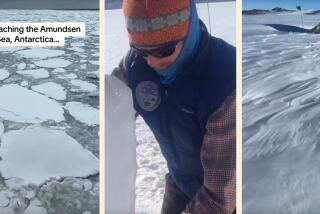A climate change dust-up
Reporting from Washington and London — Is it a “Warmist Conspiracy,” or a case of an e-mail being “taken completely out of context”?
Regardless, the latest dust-up over the science of climate change appears unlikely to affect the dynamics of either a pending debate in the Senate or international climate negotiations in Copenhagen next month.
Conservative bloggers have seized on a series of e-mails between leading climate scientists, which were obtained by computer hackers and posted online last week, as evidence of a scientific conspiracy to push claims about human-caused global warming.
But advocates of action to curb global warming dismiss those claims, and political leaders and analysts say the Senate bill to limit greenhouse gas emissions will sink or swim based on economics, not science.
“The scientists are going to fight about this for decades,” said Robert Dillon, a spokesman for Sen. Lisa Murkowski of Alaska, one of several Senate Republicans who say they are open to some form of a climate bill. “We should be doing something to curb our emissions that would not harm the economy, and could in fact boost the economy,” he said.
The British institution at the center of the debate confirmed Saturday that its server had been hacked and that it had contacted the police to pursue an investigation of what it believes was a criminal act.
The University of East Anglia said it could not confirm the authenticity of all the hacked data, including e-mails that have been published on the Internet, because of their sheer volume.
But it accused the hackers of using the material selectively and out of context to undermine the “strong consensus” that global warming exists, and declared that such misuse of information “cannot be considered a genuine attempt to engage with this issue in a responsible way.”
An e-mail by one of the university’s professors, Phil Jones, has been singled out by skeptics as proof that scientists have deliberately misled the public on the issue.
In the 1999 e-mail, Jones wrote of using a “trick” to hide an apparent decline in recent global temperatures on a chart being prepared for use by a meteorological organization. But in a statement posted on the university’s website Saturday, Jones said that the e-mail had been “taken completely out of context” and that there had been no misrepresentation of data.
“The word ‘trick’ was used here colloquially as in a clever thing to do. It is ludicrous to suggest that it refers to anything untoward,” Jones said.
Skeptics of man-made global warming disagreed, trumpeting the e-mails online. “The Death Blow to Climate Science,” one website headlined. Another hailed a “Warmist Conspiracy.”
Last week, the leading Republican on the Senate Committee on Environment and Public Works, James M. Inhofe of Oklahoma, declared 2009 “The Year of the Skeptic”; on Saturday, a spokesman for environment committee Republicans, Matt Dempsey, said the e-mails, if authentic, “would have a profound impact on the debate” over the climate bill.
Advocates of the bill disagreed. “The science is clearly on the side of those who are concerned the world is warming,” said Joshua Freed, a senior advisor for clean energy at the think tank Third Way.
The e-mail controversy, said Josh Dorner, a spokesman for the pro-climate bill group Clean Energy Works, “does absolutely nothing to change the fact that we are now closer than ever before to reaching binding international and domestic deals. We have a path to success in the Senate and at Copenhagen and beyond.”
A clear majority of senators appears to back some action to curb greenhouse gas emissions. President Obama and congressional leaders have framed their support for the bill largely in terms of its potential to create “clean energy” jobs in the United States.
More to Read
Sign up for Essential California
The most important California stories and recommendations in your inbox every morning.
You may occasionally receive promotional content from the Los Angeles Times.











